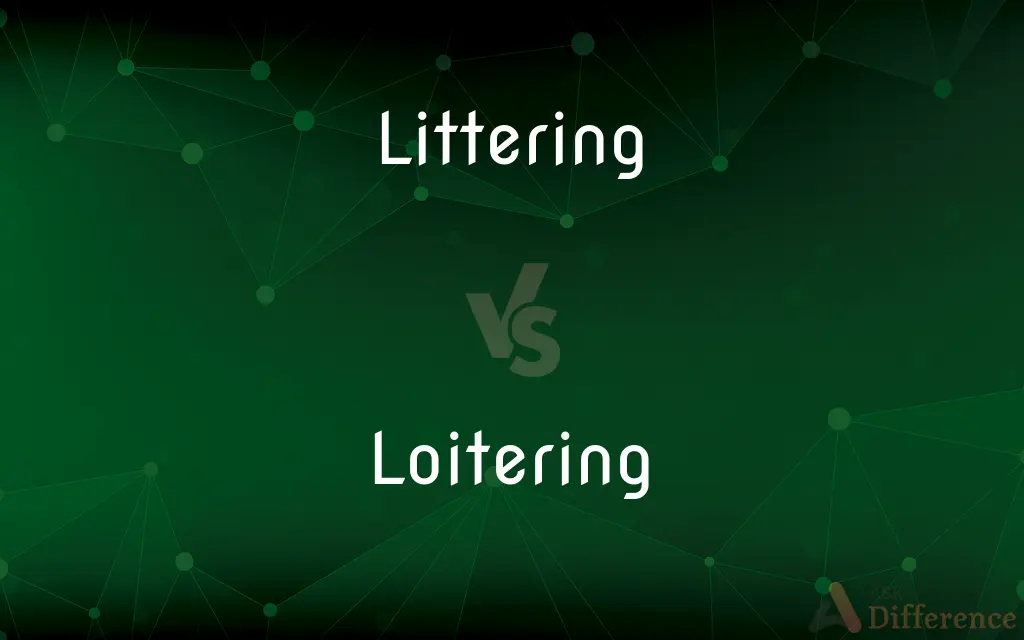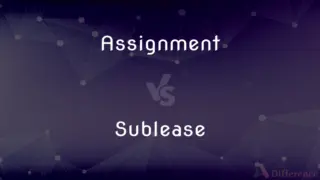Littering vs. Loitering — What's the Difference?
By Tayyaba Rehman & Maham Liaqat — Updated on March 18, 2024
Littering involves disposing of waste improperly; loitering refers to staying in a place without purpose.

Difference Between Littering and Loitering
Table of Contents
ADVERTISEMENT
Key Differences
Littering is the act of discarding waste materials in inappropriate places, leading to environmental pollution and degradation. In contrast, loitering signifies remaining or lingering in a specific area without any clear reason or purpose, often raising concerns about public order and safety. The primary distinction lies in littering being an environmental issue, whereas loitering pertains more to social and legal aspects regarding the use of public spaces.
While littering directly impacts the cleanliness, aesthetics, and health of public areas, potentially attracting penalties aimed at preserving environmental integrity, loitering is often associated with laws and ordinances designed to prevent disorderly behavior and misuse of public spaces. This highlights how actions considered to be littering contribute to tangible physical damage to surroundings, while loitering raises concerns about the potential for disruptive or criminal activities.
Efforts to combat littering typically involve public education campaigns, stricter regulations, and fines, emphasizing the responsibility of individuals to maintain environmental cleanliness. On the other hand, addressing loitering often requires a nuanced approach, balancing the enforcement of laws with the rights of individuals to freely move and assemble. This difference underscores the environmental focus of littering initiatives versus the social and legal dimensions of loitering regulations.
Practically, littering can be mitigated through infrastructure improvements like providing more trash bins and recycling facilities, alongside encouraging personal accountability. Meanwhile, measures against loitering may include signage indicating no-loitering zones, increased surveillance, and community policing efforts, reflecting the distinct strategies needed to address these issues.
Understanding the distinction between littering and loitering is crucial for recognizing the separate impacts each has on communities and the environment. Littering erodes the beauty and health of public spaces, requiring environmental stewardship, whereas loitering involves complex considerations of public order, personal freedoms, and the social fabric of neighborhoods.
ADVERTISEMENT
Comparison Chart
Definition
Improper disposal of waste materials in public or private spaces.
Staying in a place for no apparent reason, often perceived as suspicious.
Primary Concern
Environmental pollution and degradation.
Public order and safety.
Legal Consequences
Fines and penalties for damaging the environment.
Possible charges or fines for trespassing or causing disturbances.
Mitigation Strategies
Public education, more waste disposal options, enforcement of fines.
No-loitering signs, surveillance, community policing.
Impact
Directly harms ecosystems, aesthetics, and public health.
May lead to perceived or actual increases in crime and diminish the sense of community.
Compare with Definitions
Littering
Subject to legal penalties in many jurisdictions.
The city imposes fines for littering to discourage this behavior.
Loitering
Often regulated by laws to maintain public order.
The new ordinance targets loitering in high-crime areas to improve safety.
Littering
A global issue affecting land, waterways, and oceans.
Littering along beaches and rivers contributes to ocean pollution.
Loitering
Community policing and engagement as potential solutions.
Community events and spaces can reduce loitering by providing positive alternatives.
Littering
The act of leaving trash in inappropriate places.
Littering in the park can harm wildlife and pollute the environment.
Loitering
Can be a symptom of broader social issues.
Increased loitering in an area may indicate a lack of community engagement or resources.
Littering
Can lead to significant environmental and health issues.
Improperly discarded waste contributes to pollution and can attract pests.
Loitering
Remaining in a place without obvious purpose.
Loitering outside businesses can deter customers and create safety concerns.
Littering
Preventable through public education and infrastructure.
Increasing trash bins and recycling programs reduces instances of littering.
Loitering
Measures against it can raise civil liberties questions.
Enforcement of loitering laws must balance safety with respect for individual freedoms.
Littering
Carelessly discarded refuse, such as wastepaper
The litter in the streets after a parade.
Loitering
Loitering is the act of remaining in a particular public place for a protracted time, without any apparent purpose.While the laws regarding loitering have been challenged and changed over time, loitering is still illegal in various jurisdictions and in specific circumstances.
Littering
A disorderly accumulation of objects; a pile. “An iron washstand [stood] in the corner amidst a litter of soap and soiled towels” (Molly Gloss).
Loitering
To stand idly about; linger without any purpose.
Littering
The group of offspring produced at one birth by a mammal.
Loitering
(Law) To violate a law or ordinance that prohibits persons from remaining in a given location without a clear purpose for an extended period of time, especially when behaving in a manner indicating a possible threat to persons or property in the vicinity.
Littering
Material, such as straw, used as bedding for animals.
Loitering
To hover over or remain near an area
Fog loitered over the mountains. A jet loitered in the sky near the airbase.
Littering
An absorbent material for covering the floor of an animal's cage or litterbox.
Loitering
To proceed slowly or with many stops
Loitered all the way home.
Littering
An enclosed or curtained couch mounted on shafts and used to carry a single passenger.
Loitering
To act slowly or with leisure; take one's time
"The organist loitered over the keys, making sure of his mastery of the coming Sabbath anthem" (O. Henry).
Littering
Fallen leaves and other decaying organic matter that make up the top layer of a forest floor.
Loitering
Present participle of loiter
Littering
To give birth to (a litter).
Loitering
The action of the verb loiter.
A book about my loiterings in Europe
Littering
To make untidy by discarding rubbish carelessly
Someone had littered the beach with food wrappers.
Littering
To scatter about
Littered towels all over the locker room.
Littering
To be scattered about (an area)
“A lot of torn envelopes and open letters littered his bed” (Joseph Conrad).
Littering
To include certain items such as expressions throughout (a speech or piece of writing, for example)
Littered his letters with the names of powerful friends.
Littering
(Archaic) To supply (animals) with litter for bedding or floor covering.
Littering
To give birth to a litter.
Littering
To scatter litter.
Littering
Present participle of litter
Littering
The dropping of litter.
Common Curiosities
Is loitering always a crime?
Not always; the legality depends on local laws and the context of the behavior.
What constitutes littering?
Littering involves discarding waste in non-designated areas, affecting environmental cleanliness and health.
How does littering impact wildlife?
Littering can harm wildlife through ingestion, entanglement, and habitat disruption.
What are the consequences of loitering?
Consequences can include legal penalties, reduced public safety, and potential harm to business and community well-being.
How can communities reduce littering?
Communities can reduce littering through education, providing adequate disposal facilities, and enforcing penalties.
What role do public spaces play in littering and loitering issues?
Public spaces are key areas of concern for both littering and loitering, highlighting the need for effective management and community engagement.
How can loitering be addressed without infringing on rights?
By focusing on community engagement, providing public amenities, and ensuring laws are applied fairly and transparently.
Can environmental design reduce littering and loitering?
Yes, thoughtful environmental design can provide natural solutions to discourage both behaviors.
What impact does littering have on public perception?
It can significantly degrade the visual appeal of an area and suggest a lack of community care and pride.
Why is loitering often prohibited?
Loitering is prohibited to prevent potential disorderly behavior and ensure public safety and comfort.
Are there any positive aspects of loitering?
While typically viewed negatively, in some contexts, loitering can reflect vibrant public spaces where people feel free to gather and socialize.
Can anti-loitering measures be controversial?
Yes, especially if they are seen as targeting specific groups or infringing on personal freedoms.
How do littering and loitering reflect on a community's health?
High rates of both can indicate broader issues of environmental disregard and social disengagement.
Why might someone loiter?
Reasons can vary widely, from lack of private space to waiting for someone or simply observing the surroundings.
What is the difference between littering fines and loitering penalties?
Littering fines specifically target environmental harm, while loitering penalties address concerns over public order and safety.
Share Your Discovery

Previous Comparison
Lining vs. Coating
Next Comparison
Import vs. UploadAuthor Spotlight
Written by
Tayyaba RehmanTayyaba Rehman is a distinguished writer, currently serving as a primary contributor to askdifference.com. As a researcher in semantics and etymology, Tayyaba's passion for the complexity of languages and their distinctions has found a perfect home on the platform. Tayyaba delves into the intricacies of language, distinguishing between commonly confused words and phrases, thereby providing clarity for readers worldwide.
Co-written by
Maham Liaqat














































